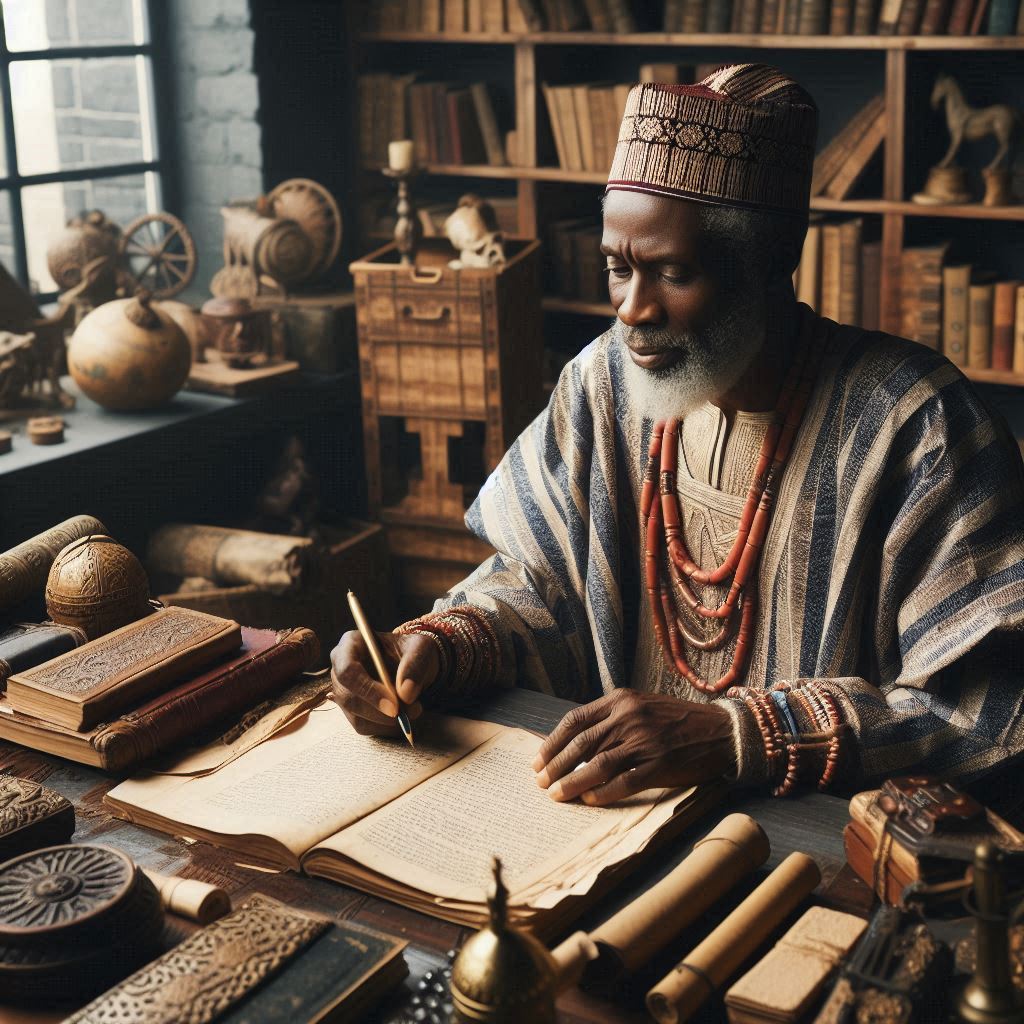Introduction
Nigerian literature has a rich history, dating back to pre-colonial times with oral storytelling traditions. It plays a crucial role in preserving and showcasing the diverse cultures and experiences of Nigeria.
Nigerian literature has gained international recognition for its unique voice and powerful storytelling, contributing to the global literary landscape. It offers a glimpse into Nigerian society, history, and complexities.
The rise of Nigerian authors such as Chinua Achebe, Wole Soyinka, and Chimamanda Ngozi Adichie has further solidified the country’s literary importance. Their works have been translated into numerous languages, including European ones.
The translations of Nigerian literature into European languages help bridge cultural gaps and make these powerful narratives accessible to a wider audience. They allow readers from different backgrounds to engage with Nigerian stories and themes.
Through these translations, Nigerian literature can reach readers around the world, sparking discussions and increasing cultural exchange. It also opens up opportunities for Nigerian authors to connect with a global readership and gain recognition on an international scale.
Overall, Nigerian literature stands as a significant force in the literary world, and its translation into European languages plays a vital role in promoting cross-cultural understanding and appreciation.
Overview of European language translations of Nigerian literature
The impact of translating Nigerian literature into European languages
Translating Nigerian literature into European languages has played a crucial role in increasing the global reach and accessibility of these literary works.
Examples of popular Nigerian literary works that have been translated
- “Things Fall Apart” by Chinua Achebe: This iconic novel has been translated into numerous languages, allowing readers worldwide to experience the rich cultural narrative of Igbo society
- “Half of a Yellow Sun” by Chimamanda Ngozi Adichie: This award-winning novel has been translated into multiple European languages, broadening its readership and impact.
- “The Fishermen” by Chigozie Obioma: This modern classic has received translations in several European languages, enabling a wider audience to engage with its powerful storytelling.
Overall, the translation of Nigerian literature into European languages serves as a bridge between cultures, fostering greater understanding and appreciation for the diverse literary landscape of Nigeria.
Read: Cosmetology and Beauty Therapy Scholarships in Nigeria
Challenges of Translating Nigerian Literature into European Languages
Translating Nigerian literature into European languages is a complex and nuanced task. Several challenges arise, particularly concerning cultural nuances and language barriers.
Ensuring that the authenticity and voice of the original work remain intact during the translation process also poses significant hurdles.
Cultural Nuances and Language Barriers
Translating Nigerian literature involves navigating rich cultural contexts. Nigerian authors often embed local idioms, proverbs, and cultural references in their works. These elements can be difficult to translate accurately.
- Idioms and Proverbs: Nigerian literature often includes idiomatic expressions that have deep cultural meanings. Translating these idioms directly can result in loss of meaning or confusion.
- Cultural References: Many works contain references to local traditions, customs, and historical events. Translators must understand these references to convey the correct context in the target language.
- Language Structure: Nigerian languages have unique syntactical structures. Translators need to adapt these structures without losing the original intent or tone.
- Colloquial Language: Authors frequently use local slang and colloquial expressions. These are challenging to translate while preserving their original flavor and impact.
Maintaining Authenticity and Voice
Maintaining the authenticity and voice of the original work is crucial in translation. The translator’s task is to ensure that the translated text resonates with the same power and emotion as the original.
- Author’s Voice: Each author has a distinct style and voice. Translators must capture this voice in the target language to maintain the work’s integrity.
- Narrative Style: The narrative style, whether it is poetic, humorous, or formal, should be preserved. This requires a deep understanding of both the source and target languages.
- Character Dialogues: Characters in Nigerian literature often speak in a way that reflects their cultural and social background. Translators must retain these nuances to keep the characters authentic.
- Emotional Impact: The emotional tone of the original work must be reflected in the translation. This involves conveying subtleties and underlying emotions accurately.
Strategies to Overcome Challenges
Translators use several strategies to overcome these challenges and produce faithful translations.
- Cultural Adaptation: Translators adapt cultural references to make them understandable to the target audience while retaining their essence.
- Collaborative Efforts: Working closely with the original authors or cultural consultants can provide deeper insights into the text.
- Footnotes and Annotations: These can explain cultural nuances and references that might not be immediately clear to the reader.
- Continuous Learning: Translators continuously educate themselves about Nigerian culture and language to improve their translations.
Translating Nigerian literature into European languages is a demanding process. It requires sensitivity to cultural nuances and a commitment to preserving the original work’s authenticity and voice.
By understanding and addressing these challenges, translators can bring the richness of Nigerian literature to a wider audience, ensuring that the beauty and depth of the original texts are not lost in translation.
Read: How to Open a Beauty Salon in Nigeria: Step-by-Step
Benefits of translating Nigerian literature into European languages
Translating Nigerian literature into European languages comes with numerous benefits, not just for the writers themselves but also for the literary world as a whole. Here are some of the key advantages:
Increased readership and global recognition for Nigerian authors
- By translating Nigerian literature into European languages, authors from Nigeria can reach a wider audience.
- This exposure not only increases readership but also helps in building a global reputation for Nigerian writers.
- As more people around the world have access to these translated works, the authors gain recognition on an international scale.
Bridging the gap between different cultural perspectives and promoting diversity in literature
- Translating Nigerian literature into European languages allows for the exchange of cultural ideas and perspectives.
- It enables readers from different backgrounds to gain insights into Nigerian culture and traditions.
- This process of cultural exchange promotes diversity in literature and fosters understanding between people from various parts of the world.
In essence, translating Nigerian literature into European languages has far-reaching benefits that extend beyond just the authors and their works. It plays a crucial role in promoting cross-cultural understanding, diversity, and global recognition for Nigerian writers.
Read: Cultural Exchange Between Nigeria and China

See Related Content: Career Opportunities in Political Science in Nigeria
Learn More: History of Music Education in Nigerian Universities
Delve into the Subject: Job Market for Chinese Studies Graduates in Nigeria
Gain More Insights: Sculpture and Its Influence in Nigerian Art
See Related Content: Digital Resources for African and Asian Studies
Uncover the Details: Cultural Exchange Programs in African and Asian Studies
Role of Translators in Preserving the Integrity of Nigerian Literature
Translators play a crucial role in preserving the integrity of Nigerian literature. Their work ensures that the essence and meaning of Nigerian literary works remain intact when translated into European languages.
Importance of Skilled Translators
Skilled translators are essential for accurately conveying the nuances of Nigerian literature. They understand the cultural and linguistic context of the original works. This understanding helps them to capture the author’s intent, tone, and style effectively.
Translators bridge the gap between languages and cultures. Their expertise ensures that the translated work resonates with the new audience while retaining its original flavor. This is particularly important for Nigerian literature, which is rich in cultural and historical references.
Accurate Conveyance of Meaning
Accurately conveying the meaning of Nigerian literary works requires more than just language proficiency.
Translators must have a deep understanding of Nigerian traditions, idioms, and expressions. This knowledge allows them to find the right words and phrases in the target language.
Skilled translators avoid literal translations that can distort the original meaning. Instead, they focus on capturing the spirit of the text. This approach preserves the integrity of the work and provides a true reflection of Nigerian literature.
Essence of Nigerian Literature
The essence of Nigerian literature lies in its storytelling, cultural heritage, and social commentary. Translators ensure that these elements are not lost in translation. They carefully choose words and phrases that convey the same emotions and messages as the original text.
Translators also maintain the stylistic elements of Nigerian literature. They replicate the author’s voice, narrative techniques, and literary devices. This attention to detail helps readers of the translated work to experience the same depth and richness as those reading the original.
Promoting Nigerian Literature Globally
Translators play a vital role in promoting Nigerian literature on a global scale. Their work introduces Nigerian authors to new audiences and broadens the reach of their stories. This global exposure helps to raise awareness of Nigeria’s literary heritage.
By translating Nigerian literature into European languages, translators contribute to cultural exchange. They help to share Nigeria’s unique perspectives and experiences with the world. This exchange fosters greater understanding and appreciation of Nigerian culture.
Honoring the Work of Translators
Recognizing and honoring the work of translators is important. Their contributions often go unnoticed, yet they are essential for the global dissemination of Nigerian literature. Celebrating their achievements highlights the significance of their role.
Honoring translators also encourages more professionals to enter the field. It underscores the value of their work and the impact it has on cultural preservation and promotion.
Supporting translators through awards and recognition helps to sustain the quality and integrity of literary translations.
Translators are guardians of Nigerian literature. They preserve its integrity and ensure its accurate representation in European languages.
Their work promotes Nigerian literature globally and fosters cultural understanding. Recognizing their contributions is crucial for maintaining the richness of Nigerian literary heritage.
Read: Communication Arts and Social Media Influence
Discover More: Best Nigerian Movies of the Decade
See Related Content: Mass Communication Practicals: What to Expect Nigeria
Delve into the Subject: Cultural Heritage and Its Study in Nigerian Universities
Promoting the exchange of ideas and experiences through translated Nigerian literature
Translated Nigerian literature plays a crucial role in fostering cultural understanding and empathy among readers from diverse backgrounds.
It allows people from different parts of the world to connect with Nigerian stories, traditions, and values, ultimately leading to a richer and more nuanced appreciation of the country’s vibrant literary landscape.
- Through translation, Nigerian literature can reach a global audience, breaking down barriers and creating opportunities for cross-cultural communication.
- It enables readers to immerse themselves in narratives that offer unique perspectives on Nigerian history, society, and identity.
- By making these stories accessible to a wider audience, translation helps to bridge the gap between cultures and promotes mutual respect and understanding.
Exploring the potential for collaborative projects between Nigerian and European literary communities
There is immense potential for collaborative projects between Nigerian and European literary communities, as both regions have rich literary traditions that can benefit from cross-cultural exchange and collaboration.
By working together, writers, translators, and publishers can create innovative and impactful initiatives that promote cultural diversity and mutual learning.
- Collaborative projects can involve joint translation efforts, where Nigerian works are translated into European languages and vice versa, enhancing the visibility and accessibility of literature from both regions.
- Partnerships between Nigerian and European literary communities can also facilitate the sharing of resources, knowledge, and expertise, leading to the development of new creative initiatives and the promotion of literary talent.
- Furthermore, collaborative projects can help to amplify marginalized voices, promote underrepresented literary genres, and challenge stereotypes and misconceptions, fostering a more inclusive and diverse literary landscape.
See Related Content: Music Festivals Celebrating Nigerian Culture
Uncover the Details: Nigerian Language Policy: Government and Education
Delve into the Subject: Job Market for Chinese Studies Graduates in Nigeria
Transform Your Career with Expert Guidance
Get personalized mentorship consulting that’s tailored to your unique path. Our expert advice is actionable and exclusive.
Get StartedConclusion
Nigerian literature offers a rich tapestry of stories and experiences.
Throughout this blog, we explored the significant impact of translating these works into European languages. These translations amplify Nigerian voices and bring diverse perspectives to global audiences.
European translations of Nigerian literature bridge cultural gaps.
They allow readers worldwide to engage with African narratives and appreciate the depth of Nigerian storytelling. This process enhances cross-cultural understanding and fosters empathy.
Translators play a crucial role in preserving the essence of original works. Their efforts ensure that the beauty and nuances of Nigerian literature are not lost. By doing so, they maintain the authenticity of the stories and characters.
Supporting the translation of Nigerian literature enriches the global literary landscape. It introduces unique voices and perspectives to international readers. This continued effort celebrates cultural diversity and broadens the horizons of global literature.
Let us continue to champion the translation of Nigerian literature. Our support can help these vibrant stories reach more readers and make a lasting impact.




